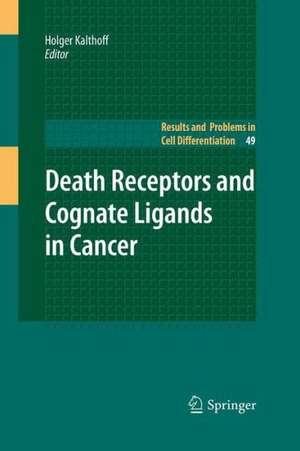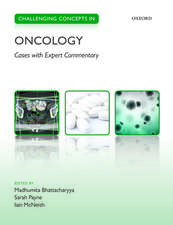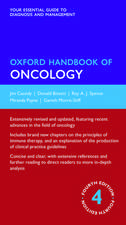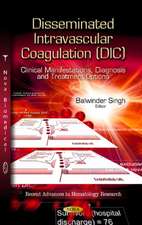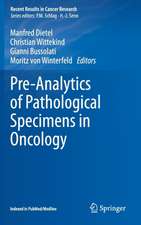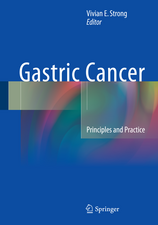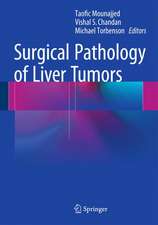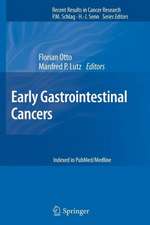Death Receptors and Cognate Ligands in Cancer: Results and Problems in Cell Differentiation, cartea 49
Editat de Holger Kalthoffen Limba Engleză Paperback – 14 mar 2012
Besides their role in the induction of cell death, evidence now exists that death receptors are able to activate several non-apoptotic signaling pathways which, depending on cellular context, may lead to apoptosis resistance, secretion of pro-inflammatory proteins, proliferation and invasive growth of cancer cells.
This book looks at the molecular basis of death receptor signaling and the role of death receptors in cancer development.
| Toate formatele și edițiile | Preț | Express |
|---|---|---|
| Paperback (1) | 1409.69 lei 6-8 săpt. | |
| Springer Berlin, Heidelberg – 14 mar 2012 | 1409.69 lei 6-8 săpt. | |
| Hardback (1) | 1419.39 lei 6-8 săpt. | |
| Springer Berlin, Heidelberg – 6 oct 2009 | 1419.39 lei 6-8 săpt. |
Din seria Results and Problems in Cell Differentiation
- 18%
 Preț: 1391.73 lei
Preț: 1391.73 lei - 15%
 Preț: 597.16 lei
Preț: 597.16 lei -
 Preț: 387.96 lei
Preț: 387.96 lei - 5%
 Preț: 373.33 lei
Preț: 373.33 lei -
 Preț: 382.18 lei
Preț: 382.18 lei -
 Preț: 385.08 lei
Preț: 385.08 lei - 15%
 Preț: 644.82 lei
Preț: 644.82 lei - 15%
 Preț: 634.00 lei
Preț: 634.00 lei -
 Preț: 387.20 lei
Preț: 387.20 lei -
 Preț: 387.75 lei
Preț: 387.75 lei - 15%
 Preț: 643.34 lei
Preț: 643.34 lei -
 Preț: 382.18 lei
Preț: 382.18 lei -
 Preț: 394.71 lei
Preț: 394.71 lei -
 Preț: 390.08 lei
Preț: 390.08 lei -
 Preț: 381.43 lei
Preț: 381.43 lei -
 Preț: 385.47 lei
Preț: 385.47 lei -
 Preț: 385.47 lei
Preț: 385.47 lei -
 Preț: 391.22 lei
Preț: 391.22 lei - 18%
 Preț: 1227.04 lei
Preț: 1227.04 lei - 20%
 Preț: 561.68 lei
Preț: 561.68 lei - 5%
 Preț: 1418.27 lei
Preț: 1418.27 lei -
 Preț: 386.00 lei
Preț: 386.00 lei -
 Preț: 377.95 lei
Preț: 377.95 lei -
 Preț: 391.61 lei
Preț: 391.61 lei -
 Preț: 388.52 lei
Preț: 388.52 lei - 18%
 Preț: 1380.63 lei
Preț: 1380.63 lei - 15%
 Preț: 639.25 lei
Preț: 639.25 lei - 18%
 Preț: 1220.12 lei
Preț: 1220.12 lei - 15%
 Preț: 642.51 lei
Preț: 642.51 lei - 15%
 Preț: 640.37 lei
Preț: 640.37 lei - 18%
 Preț: 1222.49 lei
Preț: 1222.49 lei - 18%
 Preț: 946.41 lei
Preț: 946.41 lei -
 Preț: 387.38 lei
Preț: 387.38 lei - 18%
 Preț: 1228.47 lei
Preț: 1228.47 lei - 15%
 Preț: 642.51 lei
Preț: 642.51 lei - 18%
 Preț: 1663.00 lei
Preț: 1663.00 lei - 18%
 Preț: 1225.62 lei
Preț: 1225.62 lei
Preț: 1409.69 lei
Preț vechi: 1483.88 lei
-5% Nou
Puncte Express: 2115
Preț estimativ în valută:
269.73€ • 281.65$ • 222.74£
269.73€ • 281.65$ • 222.74£
Carte tipărită la comandă
Livrare economică 15-29 aprilie
Preluare comenzi: 021 569.72.76
Specificații
ISBN-13: 9783642260766
ISBN-10: 3642260764
Pagini: 296
Ilustrații: XIV, 280 p. 20 illus., 9 illus. in color.
Dimensiuni: 155 x 235 x 16 mm
Greutate: 0.42 kg
Ediția:2009
Editura: Springer Berlin, Heidelberg
Colecția Springer
Seria Results and Problems in Cell Differentiation
Locul publicării:Berlin, Heidelberg, Germany
ISBN-10: 3642260764
Pagini: 296
Ilustrații: XIV, 280 p. 20 illus., 9 illus. in color.
Dimensiuni: 155 x 235 x 16 mm
Greutate: 0.42 kg
Ediția:2009
Editura: Springer Berlin, Heidelberg
Colecția Springer
Seria Results and Problems in Cell Differentiation
Locul publicării:Berlin, Heidelberg, Germany
Public țintă
ResearchCuprins
The Role of TNF in Cancer.- Many Checkpoints on the Road to Cell Death:Regulation of Fas–FasL Interactions and Fas Signaling in Peripheral Immune Responses.- FasL Expression and Reverse Signalling.- Impact of TNF-R1 and CD95 Internalization on Apoptotic and Antiapoptotic Signaling.- Ubiquitination and TNFR1 Signaling.- From Biochemical Principles of Apoptosis Induction by TRAIL to Application in Tumour Therapy.- Therapeutic Targeting of TWEAK/Fn14 in Cancer: Exploiting the Intrinsic Tumor Cell Killing Capacity of the Pathway.- APRIL in B-cell Malignancies and Autoimmunity.- Autophagy in Cancer and Chemotherapy.- Glucocorticoid-Mediated Apoptosis Resistance of Solid Tumors.- Targeting Death-Receptors in Radiation Therapy.- Death Ligands Designed to Kill: Development and Application of Targeted Cancer Therapeutics Based on Proapoptotic TNF Family Ligands.
Textul de pe ultima copertă
Death receptors play a central role in directing apoptosis in mammalian cells. This process of active cell death is important for a number of biological processes, e.g. for the regulation of the immune system. Death receptors are cell surface receptors that transmit apoptotic signals initiated by corresponding death ligands. Many complex signaling pathways are activated and apoptosis is the final result of a complex biochemical cascade of events.
Besides their role in the induction of cell death, evidence now exists that death receptors are able to activate several non-apoptotic signaling pathways which, depending on cellular context, may lead to apoptosis resistance, secretion of pro-inflammatory proteins, proliferation and invasive growth of cancer cells.
This book looks at the molecular basis of death receptor signaling and the role of death receptors in cancer development.
Besides their role in the induction of cell death, evidence now exists that death receptors are able to activate several non-apoptotic signaling pathways which, depending on cellular context, may lead to apoptosis resistance, secretion of pro-inflammatory proteins, proliferation and invasive growth of cancer cells.
This book looks at the molecular basis of death receptor signaling and the role of death receptors in cancer development.
